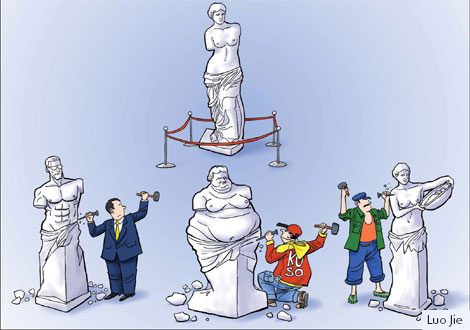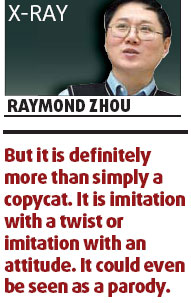By Raymond Zhou

What's so special about the term that literally means "mountain village" and is suddenly making headlines everywhere.
The first time I noticed the word "shanzhai" was a couple of months ago when the Southern Weekend carried a feature on a new kind of cell phone. It implied that "shanzhai" phones were those manufactured without filing for approvals with the authorities, thus saving hundreds of thousands of yuan in license fees. It did not specify that "shanzhai" involved imitation and possible copyright infringement.
But it is definitely more than simply a copycat. It is imitation with a twist or imitation with an attitude. It could even be seen as a parody.
An amateur who wanted to talk about Yue Fei, the Song Dynasty hero, applied to be featured on CCTV10's Lecture Room. He was turned down. "We will not consider anyone who does not possess at least the title of an associate professor," he was told. So, he used a camcorder and made his own lecture series. He was treated more kindly when he posted these online.
Another amateur embarked on a more daring endeavor: He or she remade part of the A Dream of the Red Mansion drama, using only family members. The dialogue and music were borrowed from the original television series, and the cape looks like the curtain - hey, Scarlett O'Hara did it. I was surprised that the very short episode had cut-ins and close-ups, and can be seen as a documentary as well because some of the shots show other family members doing their own thing unrelated to the plot, such as playing mahjong.
These are two of the latest "shanzhai" shows making the rounds. They are less well made than Hu Ge's spoof of The Promise some three years ago. They are kinder, gentler and have generally been received with better humor. In a sense, they occupy the middle ground between the real thing and sarcasm.
"Shanzhai" eschews innovation because innovation is costly. It does not intend to break new ground or explore new paths. It feeds on existing models of success, be they products or trends. When pretty boy actor Huang Xiaoming started a side business as a singer, he copied South Korea's Rain down to the smallest detail. His album It's Ming is said to be "shanzhai" to the core.
Advertisers have found that they can save a bundle by hiring look-alikes of big-name celebrities. So, if you spot Jay Chou in a commercial for some electronic gadget, it could be the twin brother he never had, but with the same smile and hand gesture. I guess you can't patent a person's look and manners.

The gap between most of the "shanzhai" stuff and the real McCoy is probably as wide as that of a mountain village and a metropolis. But in terms of comparability, it's a misnomer. A village would never want to be a big city. It's the third-tier cities that are caught in the get-big-quick mentality. If you tour some of the county-level towns, the government buildings and public squares are so mammoth they wouldn't look out of place in Beijing.
I've seen replicas of the Tian'anmen Rostrum, the White House, the Capitol, and now I know what to call them - "shanzhai". In fact, we have amusement parks that put together miniature versions of world monuments. They are usually named "World Parks", but calling them "Shanzhai Landmarks" would probably be more accurate.
There's no need to laugh at the "shanzhai" phenomenon. It's step one in any development, economic or cultural. When someone uses the same kind of leather to make an LV handbag, yet without the authorization of the French brand, that's piracy. When someone uses the cheapest leather, maybe not leather at all, but plastic that looks like leather, and misspells it as "LU", that - to me - elevates it or downgrades it, depending on your perspective and mood, to "shanzhai" status. I don't think LV's profits and reputation would be marred by the latter.
The "shanzhai" phenomenon is not confined to a growing economy like China. In Hollywood, a sudden hit invariably spawns a dozen imitators until the new genre runs out of steam.
However, I discovered one thing in the US that could be labeled "shanzhai in reversal". Some store brands are made by the same manufacturers who churn out name brands, using exactly the same materials and techniques. It is done to utilize extra capacity. But since the store cannot stick, say, a Coca-Cola label to its bottles of soft drink, it has to affix some other name or even the store name itself.
We Chinese are ardent believers in name brands. So, this kind of "emperor in disguise" will come much later, if at all. We have learned to dance around big things. When Ang Lee was hailed for his Crouching Tiger, Hidden Dragon, Zhang Yimou made Hero and every filmmaker suddenly found his inner martial artist. Not every one of these movies was poorly made. About the worst combination is a lack of imagination with a lack of self-deprecation. Remember The Promise?
Most of the "shanzhai" comedies are miles away from the sophistication of Saturday Night Live. And their humor could be unintended, which may turn the joke around on themselves. I still can't understand why cosplays (costume plays, where people dress up like their favorite character from comics, video games etc) are popular while real plays fail to attract paying audiences. Isn't cosplay a "shanzhai" version of theatrical art? Maybe, it's more of an extension of video games.
Or, blogging could be seen as a "shanzhai" version of the print media. Before you yell "democratization", let me linger a little longer on it: "Shanzhai" is creativity in an environment that does not encourage creativity; it is second-hand creativity; it is the clown who imitates Chaplin, the singer who sounds like Maria Carey, (Isn't Carey a "shanzhai" of Whitney Houston anyway?) and the fast food restaurant that calls itself MacTucky.
"Shanzhai" represents the baby steps of someone who wants to grow up overnight. Who says there isn't a Liu Xiang hidden inside?
(China Daily 10/31/2008 page18)
我要看更多专栏文章